Experiential Consumption and Destination Marketing
VerifiedAdded on 2023/01/18
|15
|4386
|58
AI Summary
This research study focuses on the evaluation of consumption experiences and the significance of consumption experiences in the field of destination marketing. It discusses the fundamental concept of experiential consumption and evaluates the role of experiential consumption in the area of destination marketing. The paper provides insights into destination marketing and the nature of experiences, highlighting the importance of tourism companies in the development of destination items and the manufacture of imagery of tourist experiences.
Contribute Materials
Your contribution can guide someone’s learning journey. Share your
documents today.
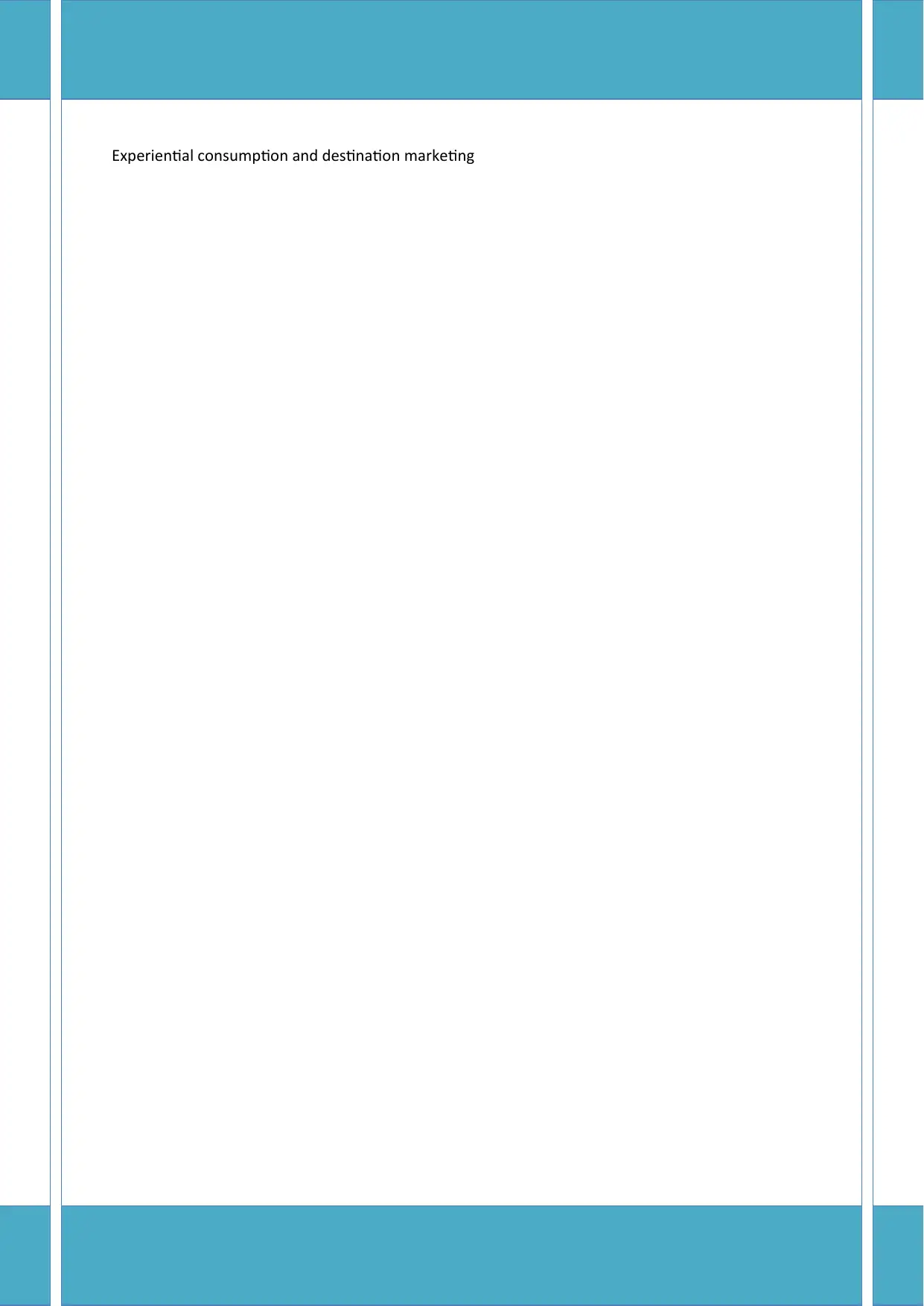
Experiential consumption and destination marketing
Secure Best Marks with AI Grader
Need help grading? Try our AI Grader for instant feedback on your assignments.
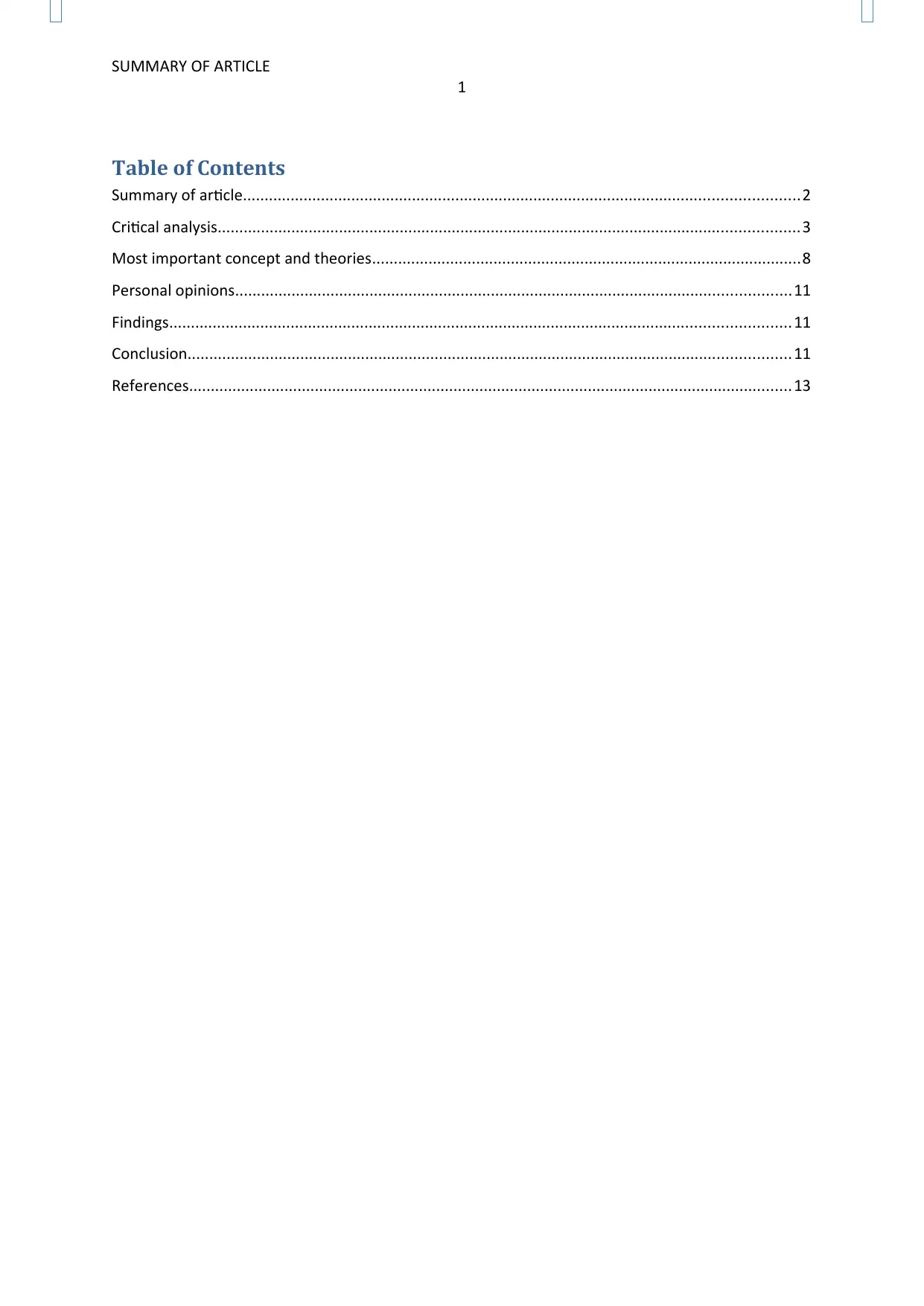
SUMMARY OF ARTICLE
1
Table of Contents
Summary of article................................................................................................................................2
Critical analysis......................................................................................................................................3
Most important concept and theories...................................................................................................8
Personal opinions................................................................................................................................11
Findings...............................................................................................................................................11
Conclusion...........................................................................................................................................11
References...........................................................................................................................................13
1
Table of Contents
Summary of article................................................................................................................................2
Critical analysis......................................................................................................................................3
Most important concept and theories...................................................................................................8
Personal opinions................................................................................................................................11
Findings...............................................................................................................................................11
Conclusion...........................................................................................................................................11
References...........................................................................................................................................13
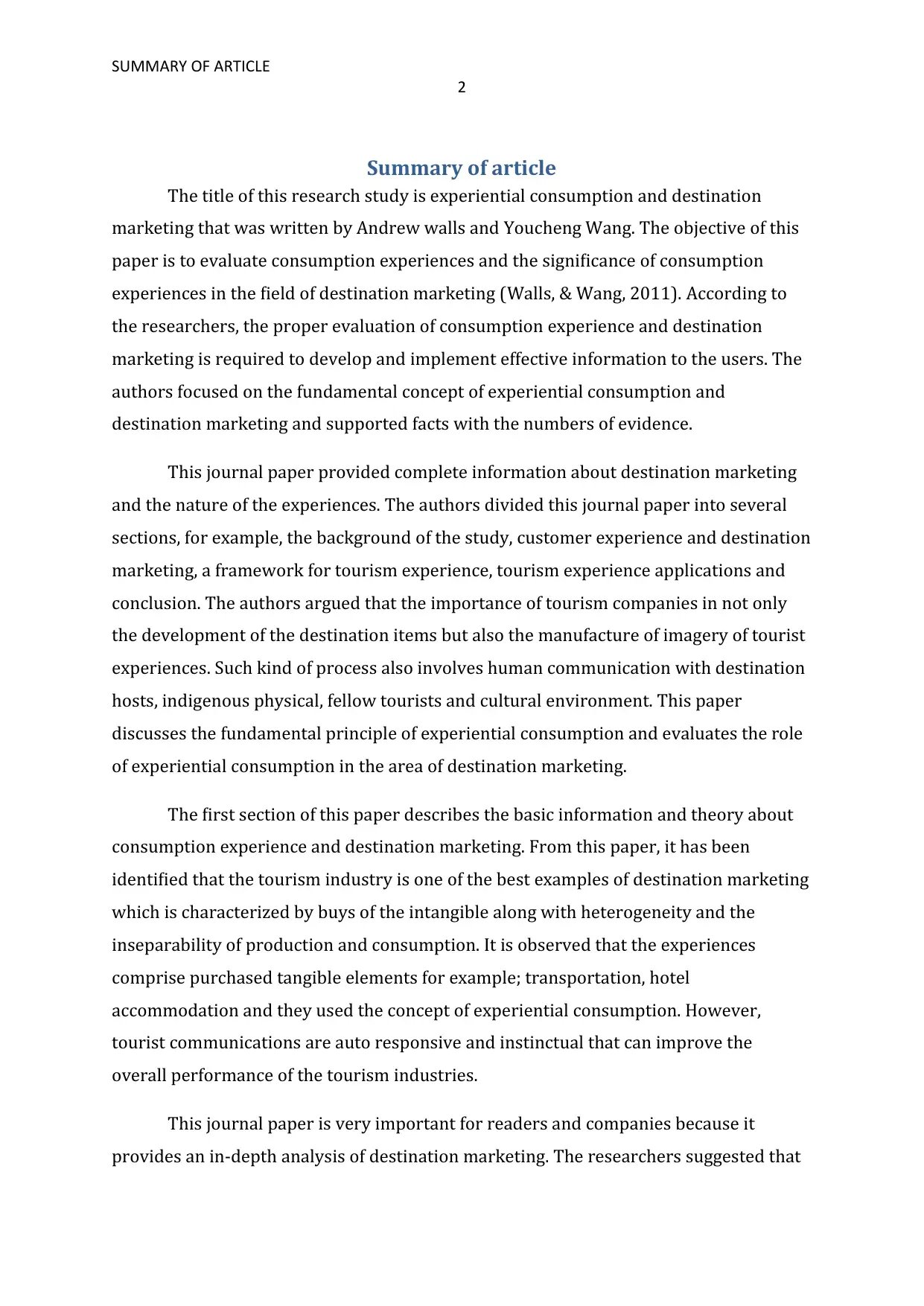
SUMMARY OF ARTICLE
2
Summary of article
The title of this research study is experiential consumption and destination
marketing that was written by Andrew walls and Youcheng Wang. The objective of this
paper is to evaluate consumption experiences and the significance of consumption
experiences in the field of destination marketing (Walls, & Wang, 2011). According to
the researchers, the proper evaluation of consumption experience and destination
marketing is required to develop and implement effective information to the users. The
authors focused on the fundamental concept of experiential consumption and
destination marketing and supported facts with the numbers of evidence.
This journal paper provided complete information about destination marketing
and the nature of the experiences. The authors divided this journal paper into several
sections, for example, the background of the study, customer experience and destination
marketing, a framework for tourism experience, tourism experience applications and
conclusion. The authors argued that the importance of tourism companies in not only
the development of the destination items but also the manufacture of imagery of tourist
experiences. Such kind of process also involves human communication with destination
hosts, indigenous physical, fellow tourists and cultural environment. This paper
discusses the fundamental principle of experiential consumption and evaluates the role
of experiential consumption in the area of destination marketing.
The first section of this paper describes the basic information and theory about
consumption experience and destination marketing. From this paper, it has been
identified that the tourism industry is one of the best examples of destination marketing
which is characterized by buys of the intangible along with heterogeneity and the
inseparability of production and consumption. It is observed that the experiences
comprise purchased tangible elements for example; transportation, hotel
accommodation and they used the concept of experiential consumption. However,
tourist communications are auto responsive and instinctual that can improve the
overall performance of the tourism industries.
This journal paper is very important for readers and companies because it
provides an in-depth analysis of destination marketing. The researchers suggested that
2
Summary of article
The title of this research study is experiential consumption and destination
marketing that was written by Andrew walls and Youcheng Wang. The objective of this
paper is to evaluate consumption experiences and the significance of consumption
experiences in the field of destination marketing (Walls, & Wang, 2011). According to
the researchers, the proper evaluation of consumption experience and destination
marketing is required to develop and implement effective information to the users. The
authors focused on the fundamental concept of experiential consumption and
destination marketing and supported facts with the numbers of evidence.
This journal paper provided complete information about destination marketing
and the nature of the experiences. The authors divided this journal paper into several
sections, for example, the background of the study, customer experience and destination
marketing, a framework for tourism experience, tourism experience applications and
conclusion. The authors argued that the importance of tourism companies in not only
the development of the destination items but also the manufacture of imagery of tourist
experiences. Such kind of process also involves human communication with destination
hosts, indigenous physical, fellow tourists and cultural environment. This paper
discusses the fundamental principle of experiential consumption and evaluates the role
of experiential consumption in the area of destination marketing.
The first section of this paper describes the basic information and theory about
consumption experience and destination marketing. From this paper, it has been
identified that the tourism industry is one of the best examples of destination marketing
which is characterized by buys of the intangible along with heterogeneity and the
inseparability of production and consumption. It is observed that the experiences
comprise purchased tangible elements for example; transportation, hotel
accommodation and they used the concept of experiential consumption. However,
tourist communications are auto responsive and instinctual that can improve the
overall performance of the tourism industries.
This journal paper is very important for readers and companies because it
provides an in-depth analysis of destination marketing. The researchers suggested that
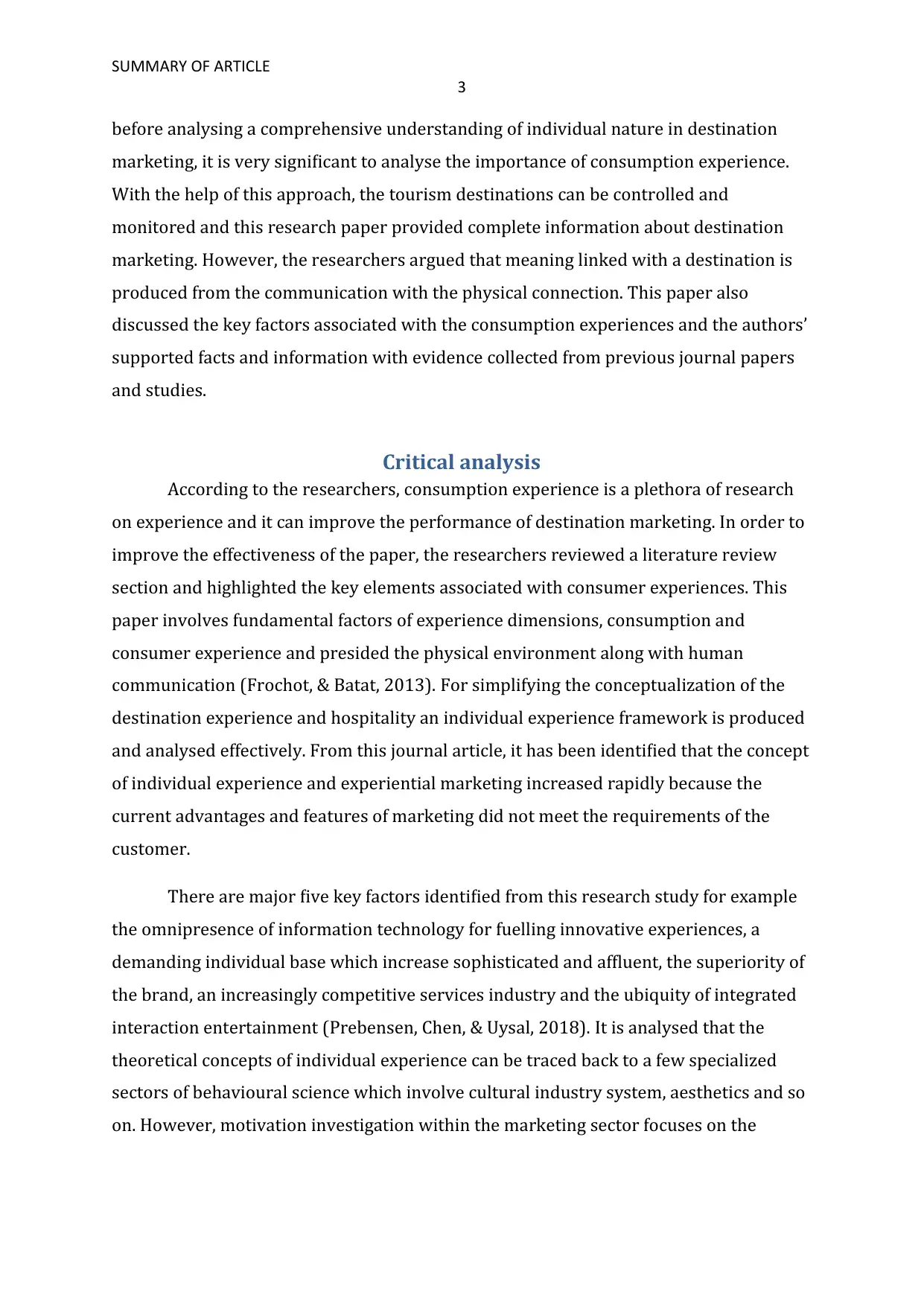
SUMMARY OF ARTICLE
3
before analysing a comprehensive understanding of individual nature in destination
marketing, it is very significant to analyse the importance of consumption experience.
With the help of this approach, the tourism destinations can be controlled and
monitored and this research paper provided complete information about destination
marketing. However, the researchers argued that meaning linked with a destination is
produced from the communication with the physical connection. This paper also
discussed the key factors associated with the consumption experiences and the authors’
supported facts and information with evidence collected from previous journal papers
and studies.
Critical analysis
According to the researchers, consumption experience is a plethora of research
on experience and it can improve the performance of destination marketing. In order to
improve the effectiveness of the paper, the researchers reviewed a literature review
section and highlighted the key elements associated with consumer experiences. This
paper involves fundamental factors of experience dimensions, consumption and
consumer experience and presided the physical environment along with human
communication (Frochot, & Batat, 2013). For simplifying the conceptualization of the
destination experience and hospitality an individual experience framework is produced
and analysed effectively. From this journal article, it has been identified that the concept
of individual experience and experiential marketing increased rapidly because the
current advantages and features of marketing did not meet the requirements of the
customer.
There are major five key factors identified from this research study for example
the omnipresence of information technology for fuelling innovative experiences, a
demanding individual base which increase sophisticated and affluent, the superiority of
the brand, an increasingly competitive services industry and the ubiquity of integrated
interaction entertainment (Prebensen, Chen, & Uysal, 2018). It is analysed that the
theoretical concepts of individual experience can be traced back to a few specialized
sectors of behavioural science which involve cultural industry system, aesthetics and so
on. However, motivation investigation within the marketing sector focuses on the
3
before analysing a comprehensive understanding of individual nature in destination
marketing, it is very significant to analyse the importance of consumption experience.
With the help of this approach, the tourism destinations can be controlled and
monitored and this research paper provided complete information about destination
marketing. However, the researchers argued that meaning linked with a destination is
produced from the communication with the physical connection. This paper also
discussed the key factors associated with the consumption experiences and the authors’
supported facts and information with evidence collected from previous journal papers
and studies.
Critical analysis
According to the researchers, consumption experience is a plethora of research
on experience and it can improve the performance of destination marketing. In order to
improve the effectiveness of the paper, the researchers reviewed a literature review
section and highlighted the key elements associated with consumer experiences. This
paper involves fundamental factors of experience dimensions, consumption and
consumer experience and presided the physical environment along with human
communication (Frochot, & Batat, 2013). For simplifying the conceptualization of the
destination experience and hospitality an individual experience framework is produced
and analysed effectively. From this journal article, it has been identified that the concept
of individual experience and experiential marketing increased rapidly because the
current advantages and features of marketing did not meet the requirements of the
customer.
There are major five key factors identified from this research study for example
the omnipresence of information technology for fuelling innovative experiences, a
demanding individual base which increase sophisticated and affluent, the superiority of
the brand, an increasingly competitive services industry and the ubiquity of integrated
interaction entertainment (Prebensen, Chen, & Uysal, 2018). It is analysed that the
theoretical concepts of individual experience can be traced back to a few specialized
sectors of behavioural science which involve cultural industry system, aesthetics and so
on. However, motivation investigation within the marketing sector focuses on the
Secure Best Marks with AI Grader
Need help grading? Try our AI Grader for instant feedback on your assignments.
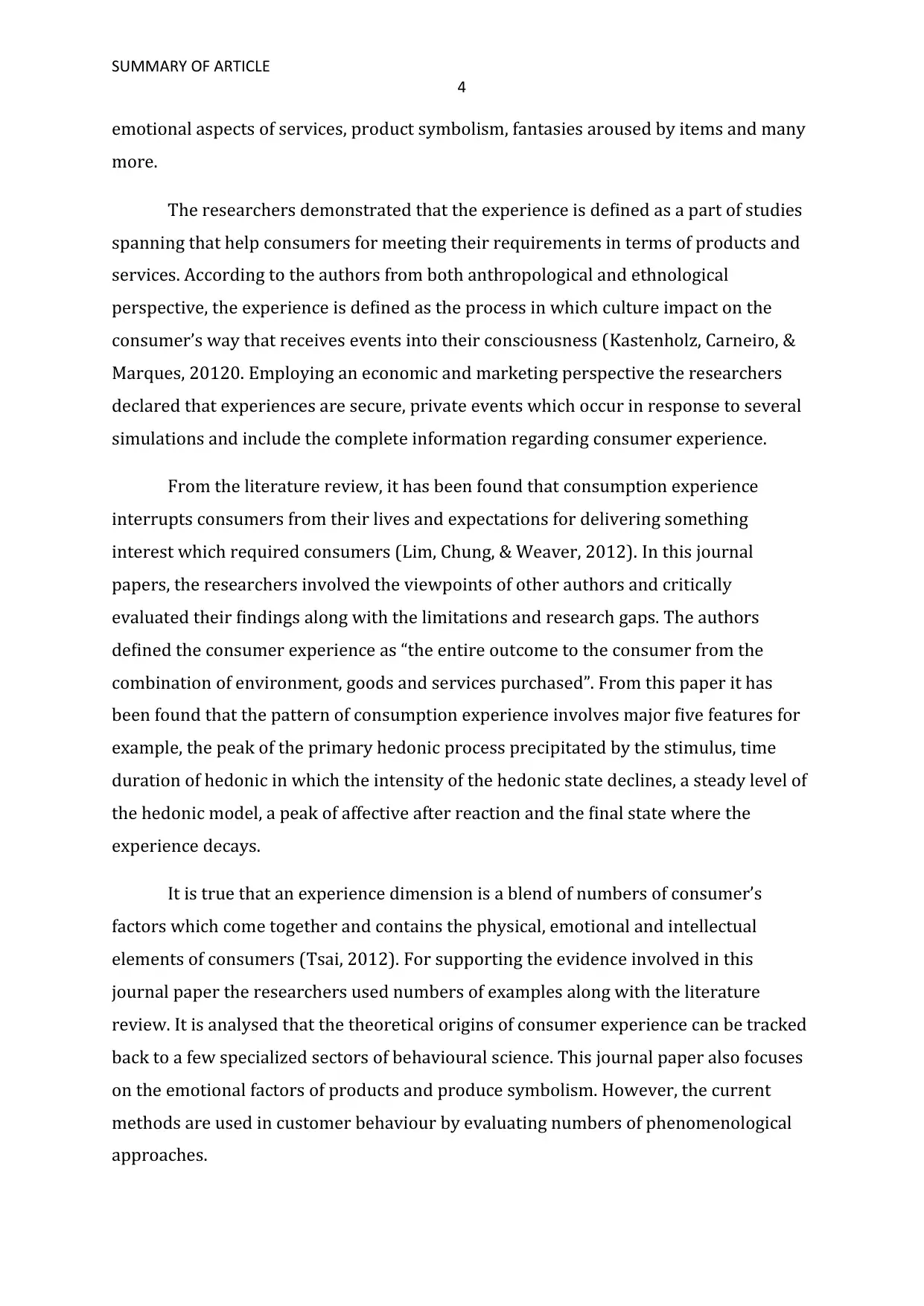
SUMMARY OF ARTICLE
4
emotional aspects of services, product symbolism, fantasies aroused by items and many
more.
The researchers demonstrated that the experience is defined as a part of studies
spanning that help consumers for meeting their requirements in terms of products and
services. According to the authors from both anthropological and ethnological
perspective, the experience is defined as the process in which culture impact on the
consumer’s way that receives events into their consciousness (Kastenholz, Carneiro, &
Marques, 20120. Employing an economic and marketing perspective the researchers
declared that experiences are secure, private events which occur in response to several
simulations and include the complete information regarding consumer experience.
From the literature review, it has been found that consumption experience
interrupts consumers from their lives and expectations for delivering something
interest which required consumers (Lim, Chung, & Weaver, 2012). In this journal
papers, the researchers involved the viewpoints of other authors and critically
evaluated their findings along with the limitations and research gaps. The authors
defined the consumer experience as “the entire outcome to the consumer from the
combination of environment, goods and services purchased”. From this paper it has
been found that the pattern of consumption experience involves major five features for
example, the peak of the primary hedonic process precipitated by the stimulus, time
duration of hedonic in which the intensity of the hedonic state declines, a steady level of
the hedonic model, a peak of affective after reaction and the final state where the
experience decays.
It is true that an experience dimension is a blend of numbers of consumer’s
factors which come together and contains the physical, emotional and intellectual
elements of consumers (Tsai, 2012). For supporting the evidence involved in this
journal paper the researchers used numbers of examples along with the literature
review. It is analysed that the theoretical origins of consumer experience can be tracked
back to a few specialized sectors of behavioural science. This journal paper also focuses
on the emotional factors of products and produce symbolism. However, the current
methods are used in customer behaviour by evaluating numbers of phenomenological
approaches.
4
emotional aspects of services, product symbolism, fantasies aroused by items and many
more.
The researchers demonstrated that the experience is defined as a part of studies
spanning that help consumers for meeting their requirements in terms of products and
services. According to the authors from both anthropological and ethnological
perspective, the experience is defined as the process in which culture impact on the
consumer’s way that receives events into their consciousness (Kastenholz, Carneiro, &
Marques, 20120. Employing an economic and marketing perspective the researchers
declared that experiences are secure, private events which occur in response to several
simulations and include the complete information regarding consumer experience.
From the literature review, it has been found that consumption experience
interrupts consumers from their lives and expectations for delivering something
interest which required consumers (Lim, Chung, & Weaver, 2012). In this journal
papers, the researchers involved the viewpoints of other authors and critically
evaluated their findings along with the limitations and research gaps. The authors
defined the consumer experience as “the entire outcome to the consumer from the
combination of environment, goods and services purchased”. From this paper it has
been found that the pattern of consumption experience involves major five features for
example, the peak of the primary hedonic process precipitated by the stimulus, time
duration of hedonic in which the intensity of the hedonic state declines, a steady level of
the hedonic model, a peak of affective after reaction and the final state where the
experience decays.
It is true that an experience dimension is a blend of numbers of consumer’s
factors which come together and contains the physical, emotional and intellectual
elements of consumers (Tsai, 2012). For supporting the evidence involved in this
journal paper the researchers used numbers of examples along with the literature
review. It is analysed that the theoretical origins of consumer experience can be tracked
back to a few specialized sectors of behavioural science. This journal paper also focuses
on the emotional factors of products and produce symbolism. However, the current
methods are used in customer behaviour by evaluating numbers of phenomenological
approaches.
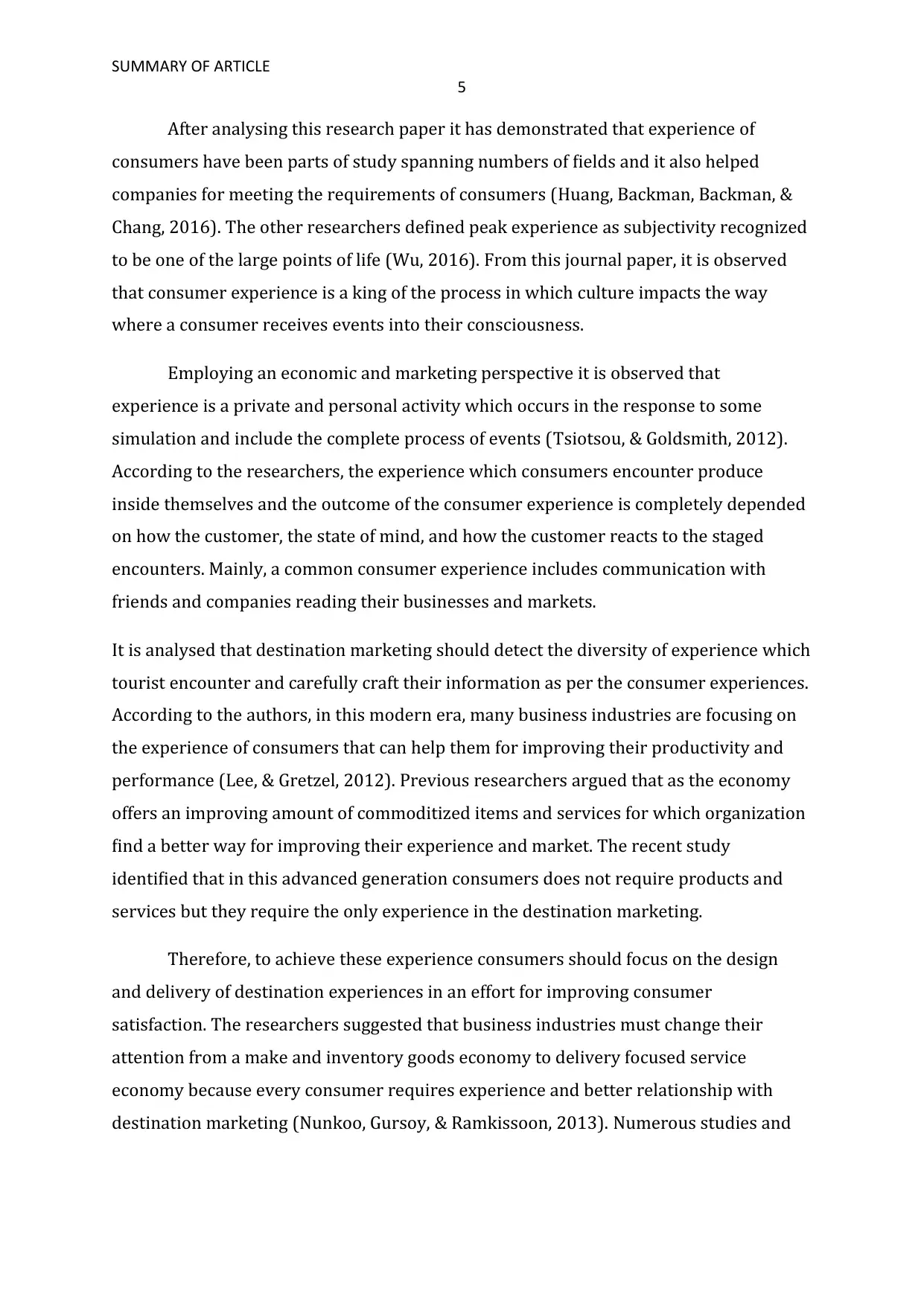
SUMMARY OF ARTICLE
5
After analysing this research paper it has demonstrated that experience of
consumers have been parts of study spanning numbers of fields and it also helped
companies for meeting the requirements of consumers (Huang, Backman, Backman, &
Chang, 2016). The other researchers defined peak experience as subjectivity recognized
to be one of the large points of life (Wu, 2016). From this journal paper, it is observed
that consumer experience is a king of the process in which culture impacts the way
where a consumer receives events into their consciousness.
Employing an economic and marketing perspective it is observed that
experience is a private and personal activity which occurs in the response to some
simulation and include the complete process of events (Tsiotsou, & Goldsmith, 2012).
According to the researchers, the experience which consumers encounter produce
inside themselves and the outcome of the consumer experience is completely depended
on how the customer, the state of mind, and how the customer reacts to the staged
encounters. Mainly, a common consumer experience includes communication with
friends and companies reading their businesses and markets.
It is analysed that destination marketing should detect the diversity of experience which
tourist encounter and carefully craft their information as per the consumer experiences.
According to the authors, in this modern era, many business industries are focusing on
the experience of consumers that can help them for improving their productivity and
performance (Lee, & Gretzel, 2012). Previous researchers argued that as the economy
offers an improving amount of commoditized items and services for which organization
find a better way for improving their experience and market. The recent study
identified that in this advanced generation consumers does not require products and
services but they require the only experience in the destination marketing.
Therefore, to achieve these experience consumers should focus on the design
and delivery of destination experiences in an effort for improving consumer
satisfaction. The researchers suggested that business industries must change their
attention from a make and inventory goods economy to delivery focused service
economy because every consumer requires experience and better relationship with
destination marketing (Nunkoo, Gursoy, & Ramkissoon, 2013). Numerous studies and
5
After analysing this research paper it has demonstrated that experience of
consumers have been parts of study spanning numbers of fields and it also helped
companies for meeting the requirements of consumers (Huang, Backman, Backman, &
Chang, 2016). The other researchers defined peak experience as subjectivity recognized
to be one of the large points of life (Wu, 2016). From this journal paper, it is observed
that consumer experience is a king of the process in which culture impacts the way
where a consumer receives events into their consciousness.
Employing an economic and marketing perspective it is observed that
experience is a private and personal activity which occurs in the response to some
simulation and include the complete process of events (Tsiotsou, & Goldsmith, 2012).
According to the researchers, the experience which consumers encounter produce
inside themselves and the outcome of the consumer experience is completely depended
on how the customer, the state of mind, and how the customer reacts to the staged
encounters. Mainly, a common consumer experience includes communication with
friends and companies reading their businesses and markets.
It is analysed that destination marketing should detect the diversity of experience which
tourist encounter and carefully craft their information as per the consumer experiences.
According to the authors, in this modern era, many business industries are focusing on
the experience of consumers that can help them for improving their productivity and
performance (Lee, & Gretzel, 2012). Previous researchers argued that as the economy
offers an improving amount of commoditized items and services for which organization
find a better way for improving their experience and market. The recent study
identified that in this advanced generation consumers does not require products and
services but they require the only experience in the destination marketing.
Therefore, to achieve these experience consumers should focus on the design
and delivery of destination experiences in an effort for improving consumer
satisfaction. The researchers suggested that business industries must change their
attention from a make and inventory goods economy to delivery focused service
economy because every consumer requires experience and better relationship with
destination marketing (Nunkoo, Gursoy, & Ramkissoon, 2013). Numerous studies and
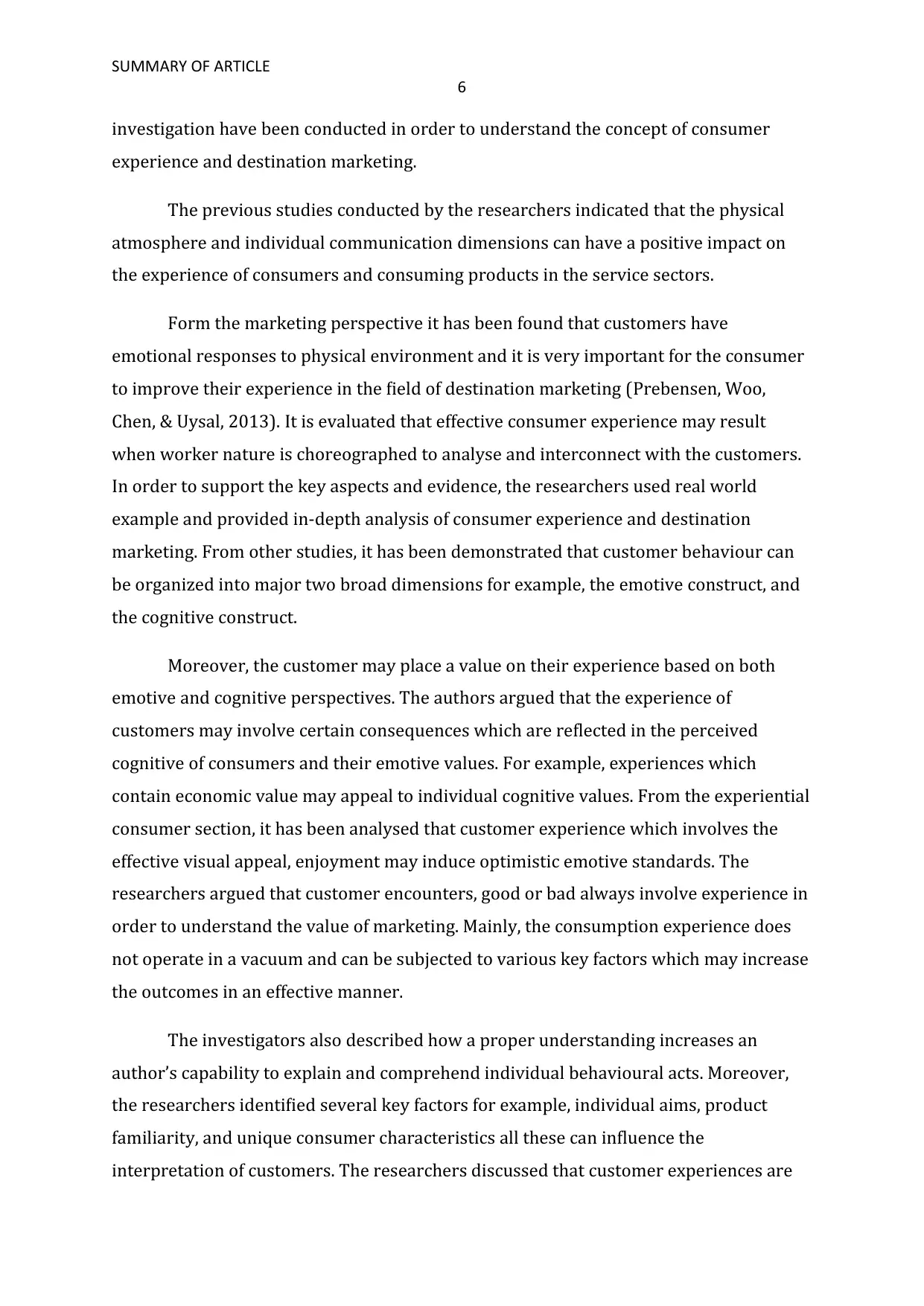
SUMMARY OF ARTICLE
6
investigation have been conducted in order to understand the concept of consumer
experience and destination marketing.
The previous studies conducted by the researchers indicated that the physical
atmosphere and individual communication dimensions can have a positive impact on
the experience of consumers and consuming products in the service sectors.
Form the marketing perspective it has been found that customers have
emotional responses to physical environment and it is very important for the consumer
to improve their experience in the field of destination marketing (Prebensen, Woo,
Chen, & Uysal, 2013). It is evaluated that effective consumer experience may result
when worker nature is choreographed to analyse and interconnect with the customers.
In order to support the key aspects and evidence, the researchers used real world
example and provided in-depth analysis of consumer experience and destination
marketing. From other studies, it has been demonstrated that customer behaviour can
be organized into major two broad dimensions for example, the emotive construct, and
the cognitive construct.
Moreover, the customer may place a value on their experience based on both
emotive and cognitive perspectives. The authors argued that the experience of
customers may involve certain consequences which are reflected in the perceived
cognitive of consumers and their emotive values. For example, experiences which
contain economic value may appeal to individual cognitive values. From the experiential
consumer section, it has been analysed that customer experience which involves the
effective visual appeal, enjoyment may induce optimistic emotive standards. The
researchers argued that customer encounters, good or bad always involve experience in
order to understand the value of marketing. Mainly, the consumption experience does
not operate in a vacuum and can be subjected to various key factors which may increase
the outcomes in an effective manner.
The investigators also described how a proper understanding increases an
author’s capability to explain and comprehend individual behavioural acts. Moreover,
the researchers identified several key factors for example, individual aims, product
familiarity, and unique consumer characteristics all these can influence the
interpretation of customers. The researchers discussed that customer experiences are
6
investigation have been conducted in order to understand the concept of consumer
experience and destination marketing.
The previous studies conducted by the researchers indicated that the physical
atmosphere and individual communication dimensions can have a positive impact on
the experience of consumers and consuming products in the service sectors.
Form the marketing perspective it has been found that customers have
emotional responses to physical environment and it is very important for the consumer
to improve their experience in the field of destination marketing (Prebensen, Woo,
Chen, & Uysal, 2013). It is evaluated that effective consumer experience may result
when worker nature is choreographed to analyse and interconnect with the customers.
In order to support the key aspects and evidence, the researchers used real world
example and provided in-depth analysis of consumer experience and destination
marketing. From other studies, it has been demonstrated that customer behaviour can
be organized into major two broad dimensions for example, the emotive construct, and
the cognitive construct.
Moreover, the customer may place a value on their experience based on both
emotive and cognitive perspectives. The authors argued that the experience of
customers may involve certain consequences which are reflected in the perceived
cognitive of consumers and their emotive values. For example, experiences which
contain economic value may appeal to individual cognitive values. From the experiential
consumer section, it has been analysed that customer experience which involves the
effective visual appeal, enjoyment may induce optimistic emotive standards. The
researchers argued that customer encounters, good or bad always involve experience in
order to understand the value of marketing. Mainly, the consumption experience does
not operate in a vacuum and can be subjected to various key factors which may increase
the outcomes in an effective manner.
The investigators also described how a proper understanding increases an
author’s capability to explain and comprehend individual behavioural acts. Moreover,
the researchers identified several key factors for example, individual aims, product
familiarity, and unique consumer characteristics all these can influence the
interpretation of customers. The researchers discussed that customer experiences are
Paraphrase This Document
Need a fresh take? Get an instant paraphrase of this document with our AI Paraphraser
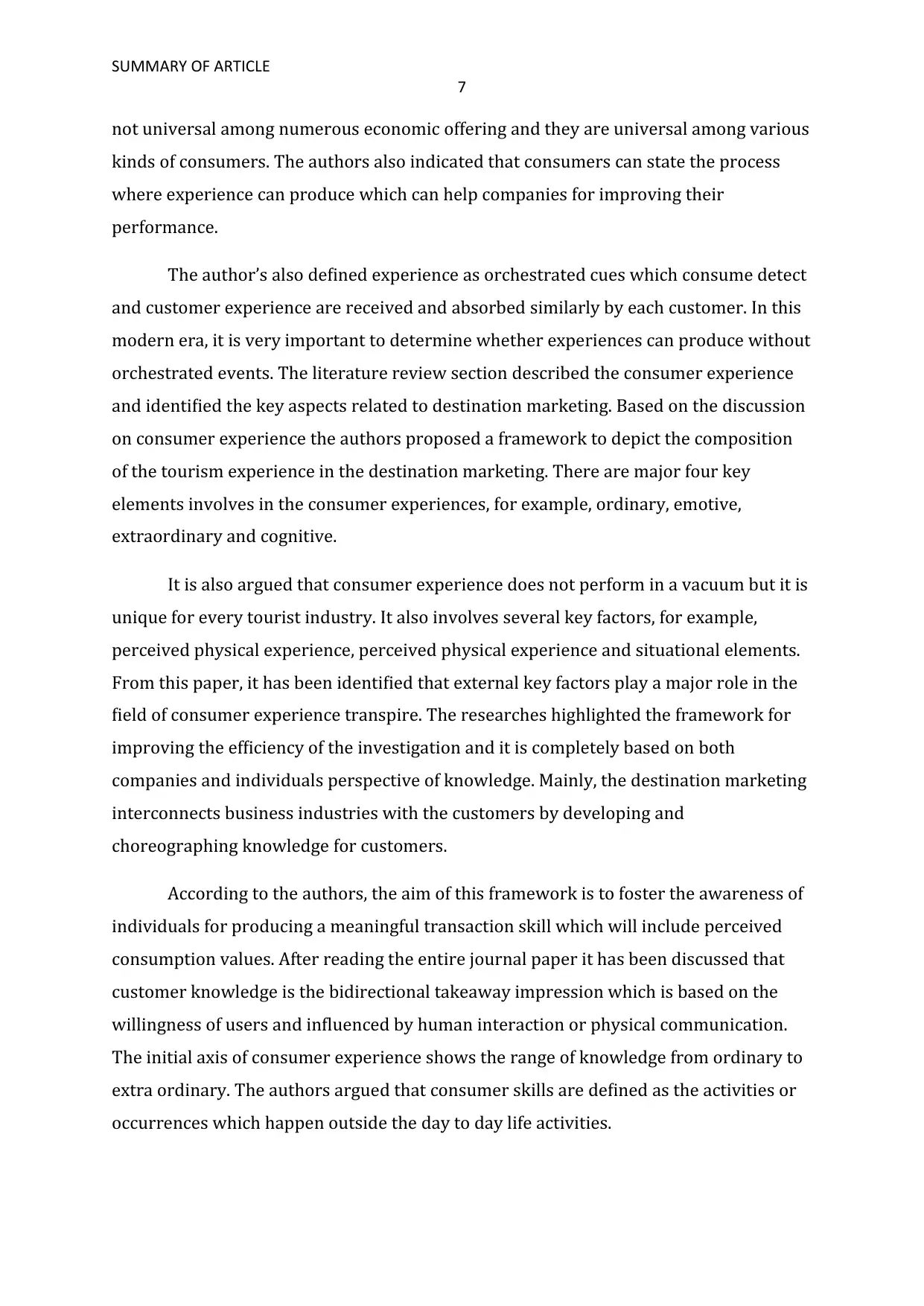
SUMMARY OF ARTICLE
7
not universal among numerous economic offering and they are universal among various
kinds of consumers. The authors also indicated that consumers can state the process
where experience can produce which can help companies for improving their
performance.
The author’s also defined experience as orchestrated cues which consume detect
and customer experience are received and absorbed similarly by each customer. In this
modern era, it is very important to determine whether experiences can produce without
orchestrated events. The literature review section described the consumer experience
and identified the key aspects related to destination marketing. Based on the discussion
on consumer experience the authors proposed a framework to depict the composition
of the tourism experience in the destination marketing. There are major four key
elements involves in the consumer experiences, for example, ordinary, emotive,
extraordinary and cognitive.
It is also argued that consumer experience does not perform in a vacuum but it is
unique for every tourist industry. It also involves several key factors, for example,
perceived physical experience, perceived physical experience and situational elements.
From this paper, it has been identified that external key factors play a major role in the
field of consumer experience transpire. The researches highlighted the framework for
improving the efficiency of the investigation and it is completely based on both
companies and individuals perspective of knowledge. Mainly, the destination marketing
interconnects business industries with the customers by developing and
choreographing knowledge for customers.
According to the authors, the aim of this framework is to foster the awareness of
individuals for producing a meaningful transaction skill which will include perceived
consumption values. After reading the entire journal paper it has been discussed that
customer knowledge is the bidirectional takeaway impression which is based on the
willingness of users and influenced by human interaction or physical communication.
The initial axis of consumer experience shows the range of knowledge from ordinary to
extra ordinary. The authors argued that consumer skills are defined as the activities or
occurrences which happen outside the day to day life activities.
7
not universal among numerous economic offering and they are universal among various
kinds of consumers. The authors also indicated that consumers can state the process
where experience can produce which can help companies for improving their
performance.
The author’s also defined experience as orchestrated cues which consume detect
and customer experience are received and absorbed similarly by each customer. In this
modern era, it is very important to determine whether experiences can produce without
orchestrated events. The literature review section described the consumer experience
and identified the key aspects related to destination marketing. Based on the discussion
on consumer experience the authors proposed a framework to depict the composition
of the tourism experience in the destination marketing. There are major four key
elements involves in the consumer experiences, for example, ordinary, emotive,
extraordinary and cognitive.
It is also argued that consumer experience does not perform in a vacuum but it is
unique for every tourist industry. It also involves several key factors, for example,
perceived physical experience, perceived physical experience and situational elements.
From this paper, it has been identified that external key factors play a major role in the
field of consumer experience transpire. The researches highlighted the framework for
improving the efficiency of the investigation and it is completely based on both
companies and individuals perspective of knowledge. Mainly, the destination marketing
interconnects business industries with the customers by developing and
choreographing knowledge for customers.
According to the authors, the aim of this framework is to foster the awareness of
individuals for producing a meaningful transaction skill which will include perceived
consumption values. After reading the entire journal paper it has been discussed that
customer knowledge is the bidirectional takeaway impression which is based on the
willingness of users and influenced by human interaction or physical communication.
The initial axis of consumer experience shows the range of knowledge from ordinary to
extra ordinary. The authors argued that consumer skills are defined as the activities or
occurrences which happen outside the day to day life activities.
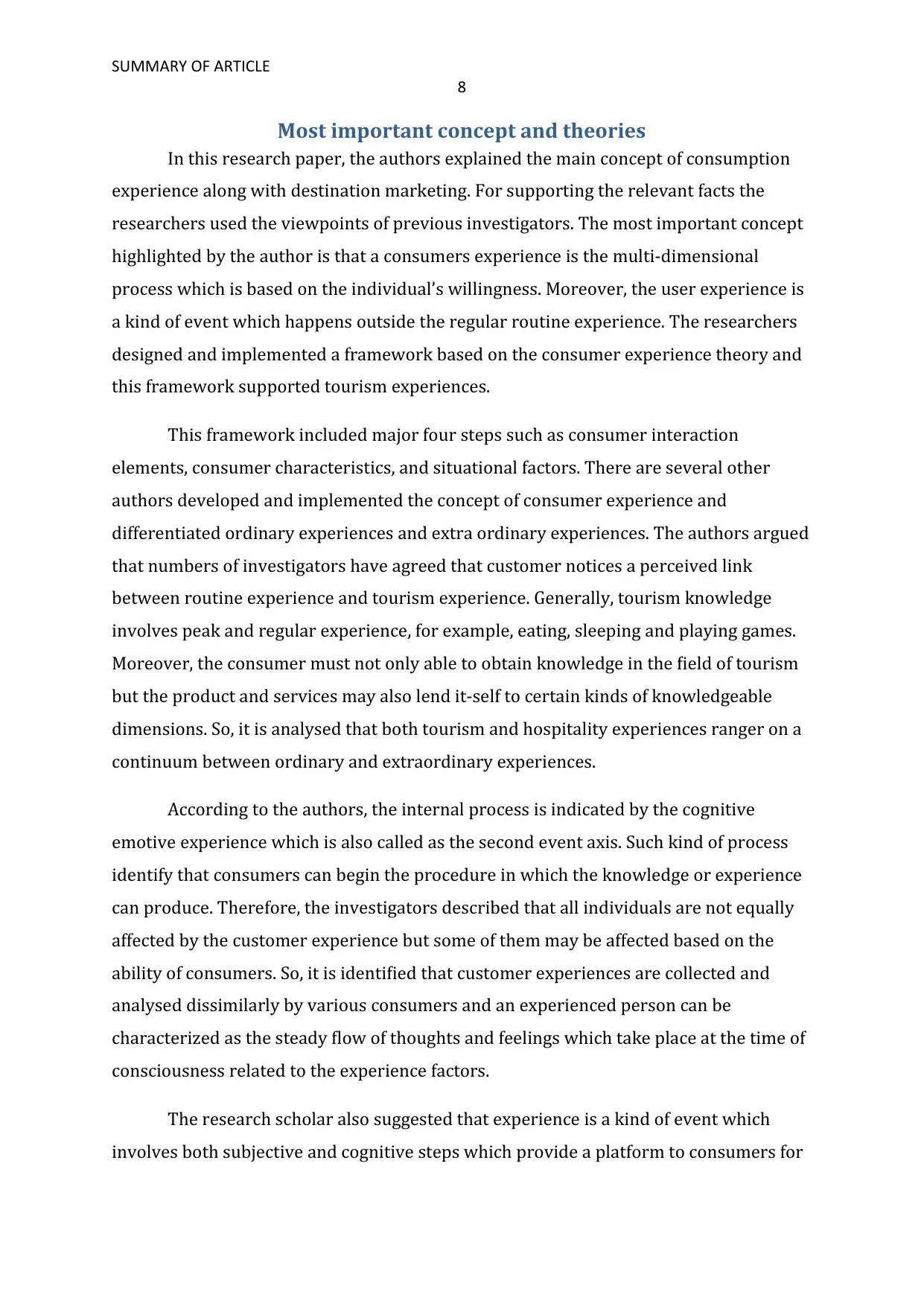
SUMMARY OF ARTICLE
8
Most important concept and theories
In this research paper, the authors explained the main concept of consumption
experience along with destination marketing. For supporting the relevant facts the
researchers used the viewpoints of previous investigators. The most important concept
highlighted by the author is that a consumers experience is the multi-dimensional
process which is based on the individual’s willingness. Moreover, the user experience is
a kind of event which happens outside the regular routine experience. The researchers
designed and implemented a framework based on the consumer experience theory and
this framework supported tourism experiences.
This framework included major four steps such as consumer interaction
elements, consumer characteristics, and situational factors. There are several other
authors developed and implemented the concept of consumer experience and
differentiated ordinary experiences and extra ordinary experiences. The authors argued
that numbers of investigators have agreed that customer notices a perceived link
between routine experience and tourism experience. Generally, tourism knowledge
involves peak and regular experience, for example, eating, sleeping and playing games.
Moreover, the consumer must not only able to obtain knowledge in the field of tourism
but the product and services may also lend it-self to certain kinds of knowledgeable
dimensions. So, it is analysed that both tourism and hospitality experiences ranger on a
continuum between ordinary and extraordinary experiences.
According to the authors, the internal process is indicated by the cognitive
emotive experience which is also called as the second event axis. Such kind of process
identify that consumers can begin the procedure in which the knowledge or experience
can produce. Therefore, the investigators described that all individuals are not equally
affected by the customer experience but some of them may be affected based on the
ability of consumers. So, it is identified that customer experiences are collected and
analysed dissimilarly by various consumers and an experienced person can be
characterized as the steady flow of thoughts and feelings which take place at the time of
consciousness related to the experience factors.
The research scholar also suggested that experience is a kind of event which
involves both subjective and cognitive steps which provide a platform to consumers for
8
Most important concept and theories
In this research paper, the authors explained the main concept of consumption
experience along with destination marketing. For supporting the relevant facts the
researchers used the viewpoints of previous investigators. The most important concept
highlighted by the author is that a consumers experience is the multi-dimensional
process which is based on the individual’s willingness. Moreover, the user experience is
a kind of event which happens outside the regular routine experience. The researchers
designed and implemented a framework based on the consumer experience theory and
this framework supported tourism experiences.
This framework included major four steps such as consumer interaction
elements, consumer characteristics, and situational factors. There are several other
authors developed and implemented the concept of consumer experience and
differentiated ordinary experiences and extra ordinary experiences. The authors argued
that numbers of investigators have agreed that customer notices a perceived link
between routine experience and tourism experience. Generally, tourism knowledge
involves peak and regular experience, for example, eating, sleeping and playing games.
Moreover, the consumer must not only able to obtain knowledge in the field of tourism
but the product and services may also lend it-self to certain kinds of knowledgeable
dimensions. So, it is analysed that both tourism and hospitality experiences ranger on a
continuum between ordinary and extraordinary experiences.
According to the authors, the internal process is indicated by the cognitive
emotive experience which is also called as the second event axis. Such kind of process
identify that consumers can begin the procedure in which the knowledge or experience
can produce. Therefore, the investigators described that all individuals are not equally
affected by the customer experience but some of them may be affected based on the
ability of consumers. So, it is identified that customer experiences are collected and
analysed dissimilarly by various consumers and an experienced person can be
characterized as the steady flow of thoughts and feelings which take place at the time of
consciousness related to the experience factors.
The research scholar also suggested that experience is a kind of event which
involves both subjective and cognitive steps which provide a platform to consumers for
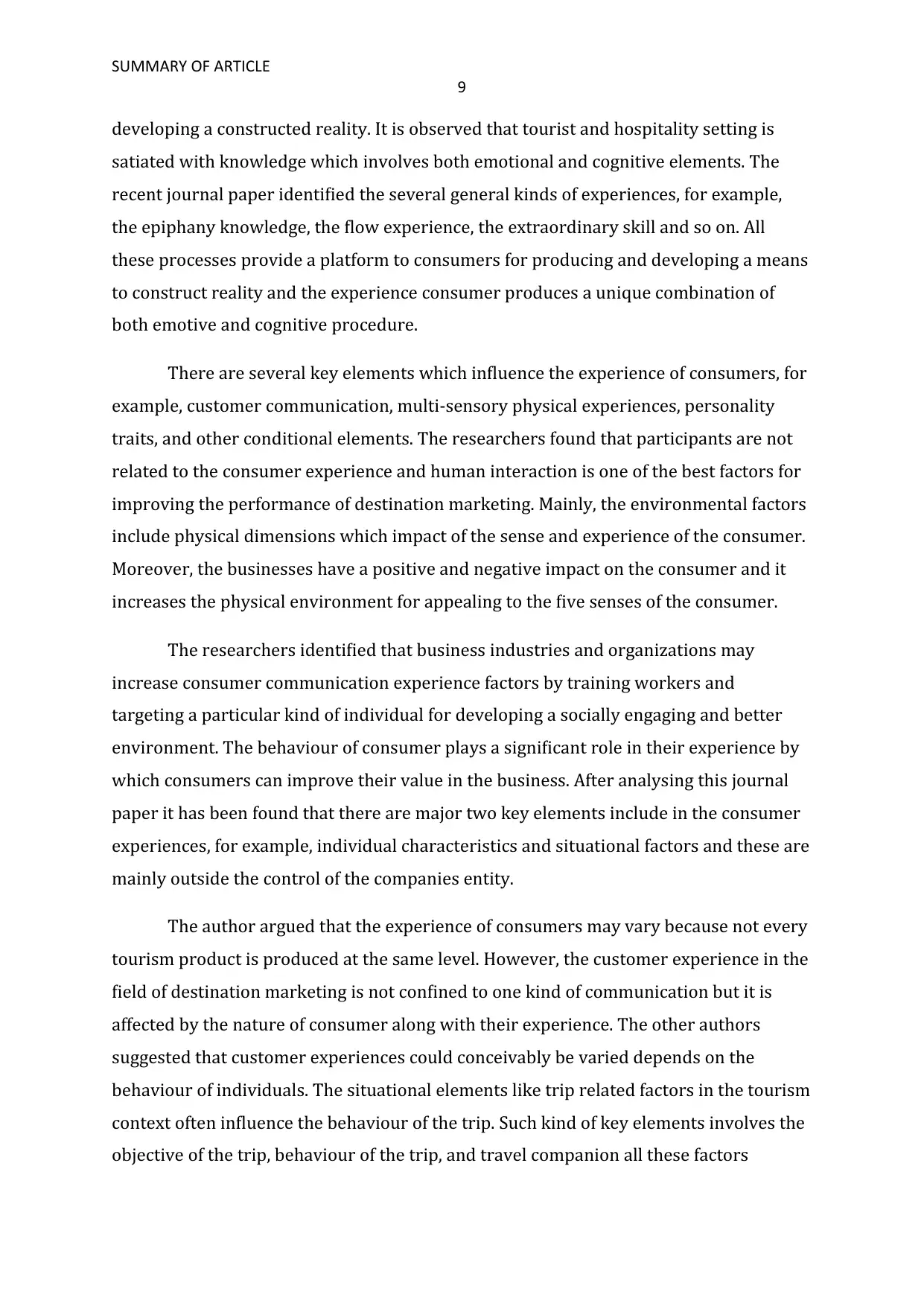
SUMMARY OF ARTICLE
9
developing a constructed reality. It is observed that tourist and hospitality setting is
satiated with knowledge which involves both emotional and cognitive elements. The
recent journal paper identified the several general kinds of experiences, for example,
the epiphany knowledge, the flow experience, the extraordinary skill and so on. All
these processes provide a platform to consumers for producing and developing a means
to construct reality and the experience consumer produces a unique combination of
both emotive and cognitive procedure.
There are several key elements which influence the experience of consumers, for
example, customer communication, multi-sensory physical experiences, personality
traits, and other conditional elements. The researchers found that participants are not
related to the consumer experience and human interaction is one of the best factors for
improving the performance of destination marketing. Mainly, the environmental factors
include physical dimensions which impact of the sense and experience of the consumer.
Moreover, the businesses have a positive and negative impact on the consumer and it
increases the physical environment for appealing to the five senses of the consumer.
The researchers identified that business industries and organizations may
increase consumer communication experience factors by training workers and
targeting a particular kind of individual for developing a socially engaging and better
environment. The behaviour of consumer plays a significant role in their experience by
which consumers can improve their value in the business. After analysing this journal
paper it has been found that there are major two key elements include in the consumer
experiences, for example, individual characteristics and situational factors and these are
mainly outside the control of the companies entity.
The author argued that the experience of consumers may vary because not every
tourism product is produced at the same level. However, the customer experience in the
field of destination marketing is not confined to one kind of communication but it is
affected by the nature of consumer along with their experience. The other authors
suggested that customer experiences could conceivably be varied depends on the
behaviour of individuals. The situational elements like trip related factors in the tourism
context often influence the behaviour of the trip. Such kind of key elements involves the
objective of the trip, behaviour of the trip, and travel companion all these factors
9
developing a constructed reality. It is observed that tourist and hospitality setting is
satiated with knowledge which involves both emotional and cognitive elements. The
recent journal paper identified the several general kinds of experiences, for example,
the epiphany knowledge, the flow experience, the extraordinary skill and so on. All
these processes provide a platform to consumers for producing and developing a means
to construct reality and the experience consumer produces a unique combination of
both emotive and cognitive procedure.
There are several key elements which influence the experience of consumers, for
example, customer communication, multi-sensory physical experiences, personality
traits, and other conditional elements. The researchers found that participants are not
related to the consumer experience and human interaction is one of the best factors for
improving the performance of destination marketing. Mainly, the environmental factors
include physical dimensions which impact of the sense and experience of the consumer.
Moreover, the businesses have a positive and negative impact on the consumer and it
increases the physical environment for appealing to the five senses of the consumer.
The researchers identified that business industries and organizations may
increase consumer communication experience factors by training workers and
targeting a particular kind of individual for developing a socially engaging and better
environment. The behaviour of consumer plays a significant role in their experience by
which consumers can improve their value in the business. After analysing this journal
paper it has been found that there are major two key elements include in the consumer
experiences, for example, individual characteristics and situational factors and these are
mainly outside the control of the companies entity.
The author argued that the experience of consumers may vary because not every
tourism product is produced at the same level. However, the customer experience in the
field of destination marketing is not confined to one kind of communication but it is
affected by the nature of consumer along with their experience. The other authors
suggested that customer experiences could conceivably be varied depends on the
behaviour of individuals. The situational elements like trip related factors in the tourism
context often influence the behaviour of the trip. Such kind of key elements involves the
objective of the trip, behaviour of the trip, and travel companion all these factors
Secure Best Marks with AI Grader
Need help grading? Try our AI Grader for instant feedback on your assignments.
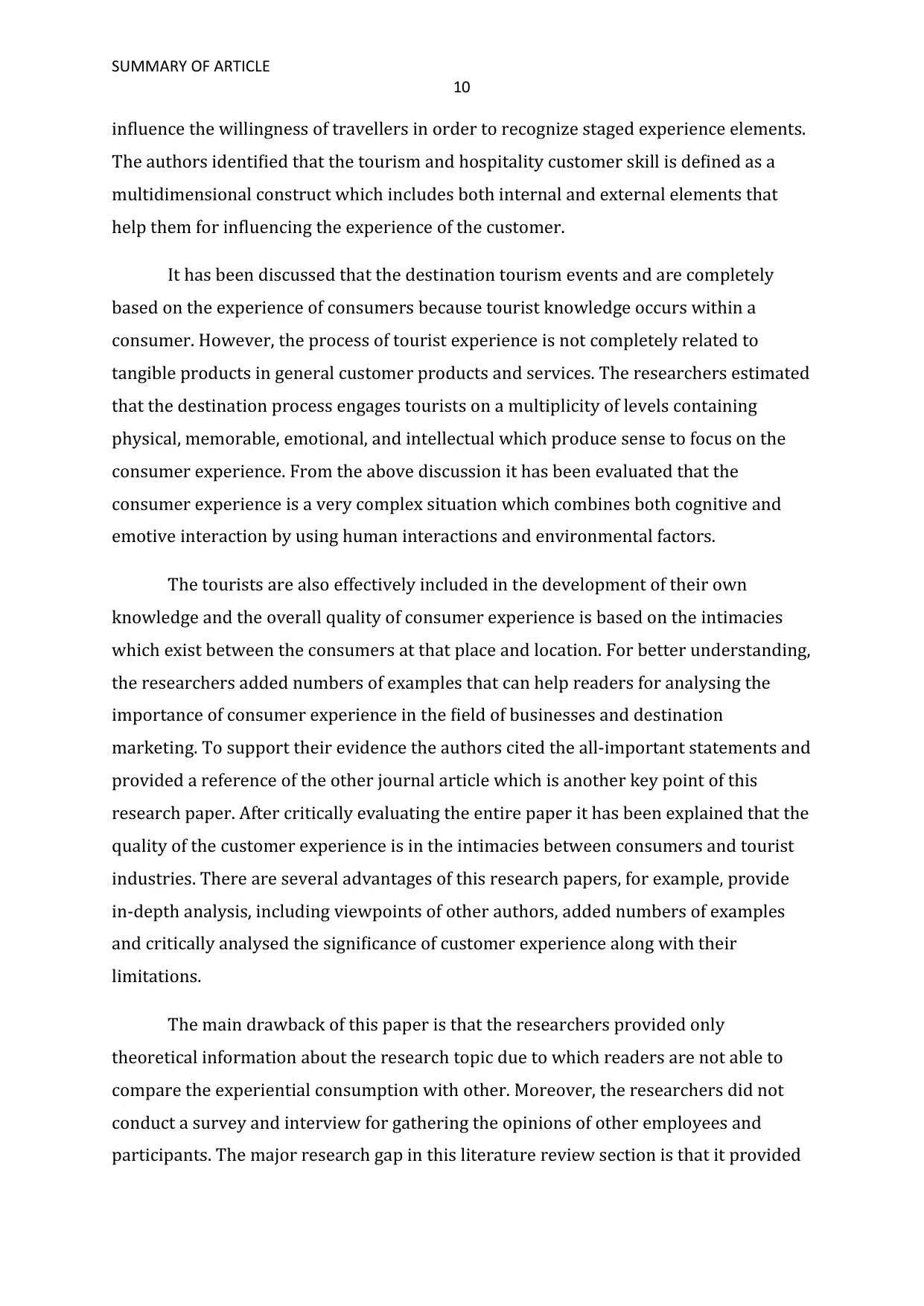
SUMMARY OF ARTICLE
10
influence the willingness of travellers in order to recognize staged experience elements.
The authors identified that the tourism and hospitality customer skill is defined as a
multidimensional construct which includes both internal and external elements that
help them for influencing the experience of the customer.
It has been discussed that the destination tourism events and are completely
based on the experience of consumers because tourist knowledge occurs within a
consumer. However, the process of tourist experience is not completely related to
tangible products in general customer products and services. The researchers estimated
that the destination process engages tourists on a multiplicity of levels containing
physical, memorable, emotional, and intellectual which produce sense to focus on the
consumer experience. From the above discussion it has been evaluated that the
consumer experience is a very complex situation which combines both cognitive and
emotive interaction by using human interactions and environmental factors.
The tourists are also effectively included in the development of their own
knowledge and the overall quality of consumer experience is based on the intimacies
which exist between the consumers at that place and location. For better understanding,
the researchers added numbers of examples that can help readers for analysing the
importance of consumer experience in the field of businesses and destination
marketing. To support their evidence the authors cited the all-important statements and
provided a reference of the other journal article which is another key point of this
research paper. After critically evaluating the entire paper it has been explained that the
quality of the customer experience is in the intimacies between consumers and tourist
industries. There are several advantages of this research papers, for example, provide
in-depth analysis, including viewpoints of other authors, added numbers of examples
and critically analysed the significance of customer experience along with their
limitations.
The main drawback of this paper is that the researchers provided only
theoretical information about the research topic due to which readers are not able to
compare the experiential consumption with other. Moreover, the researchers did not
conduct a survey and interview for gathering the opinions of other employees and
participants. The major research gap in this literature review section is that it provided
10
influence the willingness of travellers in order to recognize staged experience elements.
The authors identified that the tourism and hospitality customer skill is defined as a
multidimensional construct which includes both internal and external elements that
help them for influencing the experience of the customer.
It has been discussed that the destination tourism events and are completely
based on the experience of consumers because tourist knowledge occurs within a
consumer. However, the process of tourist experience is not completely related to
tangible products in general customer products and services. The researchers estimated
that the destination process engages tourists on a multiplicity of levels containing
physical, memorable, emotional, and intellectual which produce sense to focus on the
consumer experience. From the above discussion it has been evaluated that the
consumer experience is a very complex situation which combines both cognitive and
emotive interaction by using human interactions and environmental factors.
The tourists are also effectively included in the development of their own
knowledge and the overall quality of consumer experience is based on the intimacies
which exist between the consumers at that place and location. For better understanding,
the researchers added numbers of examples that can help readers for analysing the
importance of consumer experience in the field of businesses and destination
marketing. To support their evidence the authors cited the all-important statements and
provided a reference of the other journal article which is another key point of this
research paper. After critically evaluating the entire paper it has been explained that the
quality of the customer experience is in the intimacies between consumers and tourist
industries. There are several advantages of this research papers, for example, provide
in-depth analysis, including viewpoints of other authors, added numbers of examples
and critically analysed the significance of customer experience along with their
limitations.
The main drawback of this paper is that the researchers provided only
theoretical information about the research topic due to which readers are not able to
compare the experiential consumption with other. Moreover, the researchers did not
conduct a survey and interview for gathering the opinions of other employees and
participants. The major research gap in this literature review section is that it provided
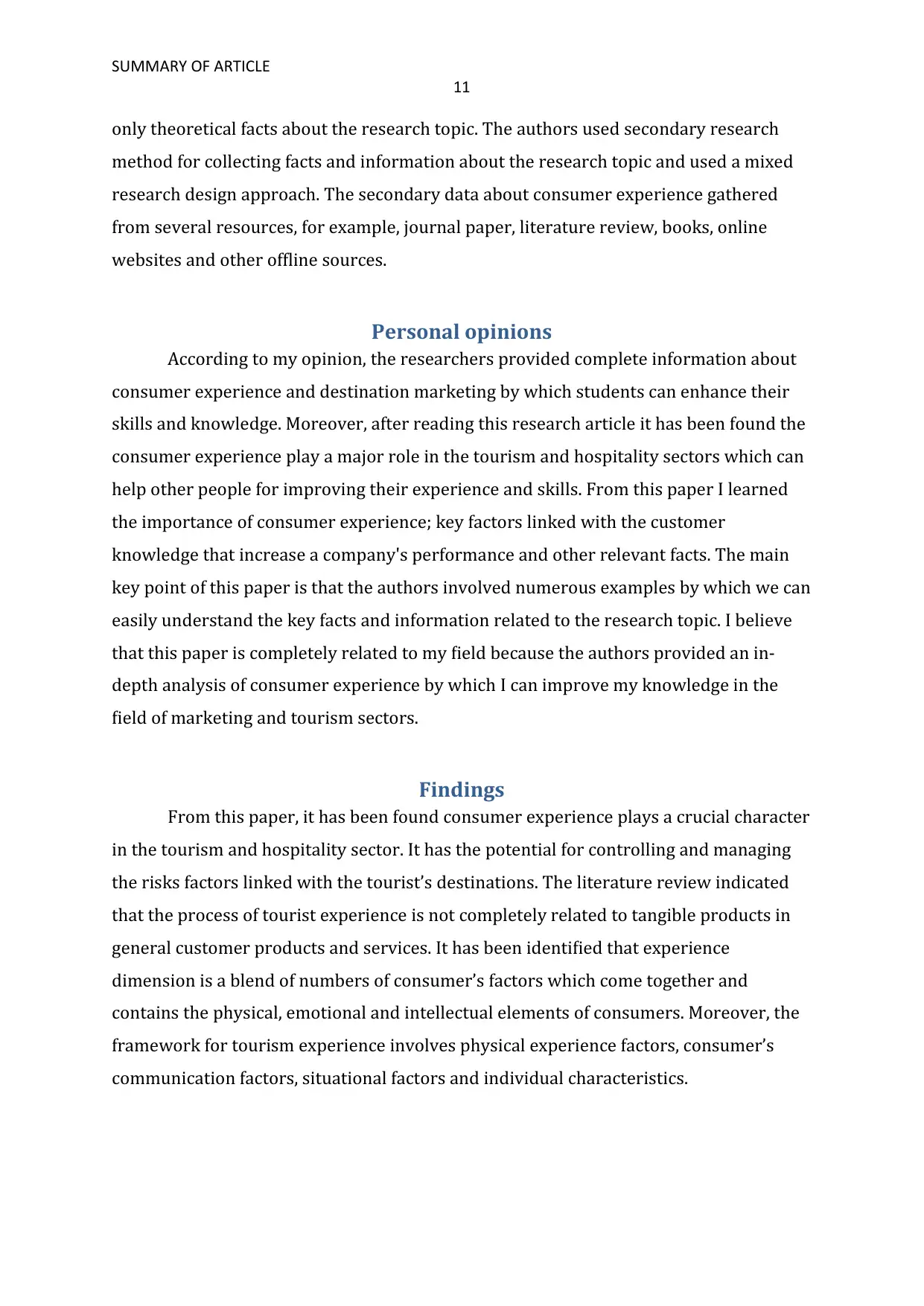
SUMMARY OF ARTICLE
11
only theoretical facts about the research topic. The authors used secondary research
method for collecting facts and information about the research topic and used a mixed
research design approach. The secondary data about consumer experience gathered
from several resources, for example, journal paper, literature review, books, online
websites and other offline sources.
Personal opinions
According to my opinion, the researchers provided complete information about
consumer experience and destination marketing by which students can enhance their
skills and knowledge. Moreover, after reading this research article it has been found the
consumer experience play a major role in the tourism and hospitality sectors which can
help other people for improving their experience and skills. From this paper I learned
the importance of consumer experience; key factors linked with the customer
knowledge that increase a company's performance and other relevant facts. The main
key point of this paper is that the authors involved numerous examples by which we can
easily understand the key facts and information related to the research topic. I believe
that this paper is completely related to my field because the authors provided an in-
depth analysis of consumer experience by which I can improve my knowledge in the
field of marketing and tourism sectors.
Findings
From this paper, it has been found consumer experience plays a crucial character
in the tourism and hospitality sector. It has the potential for controlling and managing
the risks factors linked with the tourist’s destinations. The literature review indicated
that the process of tourist experience is not completely related to tangible products in
general customer products and services. It has been identified that experience
dimension is a blend of numbers of consumer’s factors which come together and
contains the physical, emotional and intellectual elements of consumers. Moreover, the
framework for tourism experience involves physical experience factors, consumer’s
communication factors, situational factors and individual characteristics.
11
only theoretical facts about the research topic. The authors used secondary research
method for collecting facts and information about the research topic and used a mixed
research design approach. The secondary data about consumer experience gathered
from several resources, for example, journal paper, literature review, books, online
websites and other offline sources.
Personal opinions
According to my opinion, the researchers provided complete information about
consumer experience and destination marketing by which students can enhance their
skills and knowledge. Moreover, after reading this research article it has been found the
consumer experience play a major role in the tourism and hospitality sectors which can
help other people for improving their experience and skills. From this paper I learned
the importance of consumer experience; key factors linked with the customer
knowledge that increase a company's performance and other relevant facts. The main
key point of this paper is that the authors involved numerous examples by which we can
easily understand the key facts and information related to the research topic. I believe
that this paper is completely related to my field because the authors provided an in-
depth analysis of consumer experience by which I can improve my knowledge in the
field of marketing and tourism sectors.
Findings
From this paper, it has been found consumer experience plays a crucial character
in the tourism and hospitality sector. It has the potential for controlling and managing
the risks factors linked with the tourist’s destinations. The literature review indicated
that the process of tourist experience is not completely related to tangible products in
general customer products and services. It has been identified that experience
dimension is a blend of numbers of consumer’s factors which come together and
contains the physical, emotional and intellectual elements of consumers. Moreover, the
framework for tourism experience involves physical experience factors, consumer’s
communication factors, situational factors and individual characteristics.
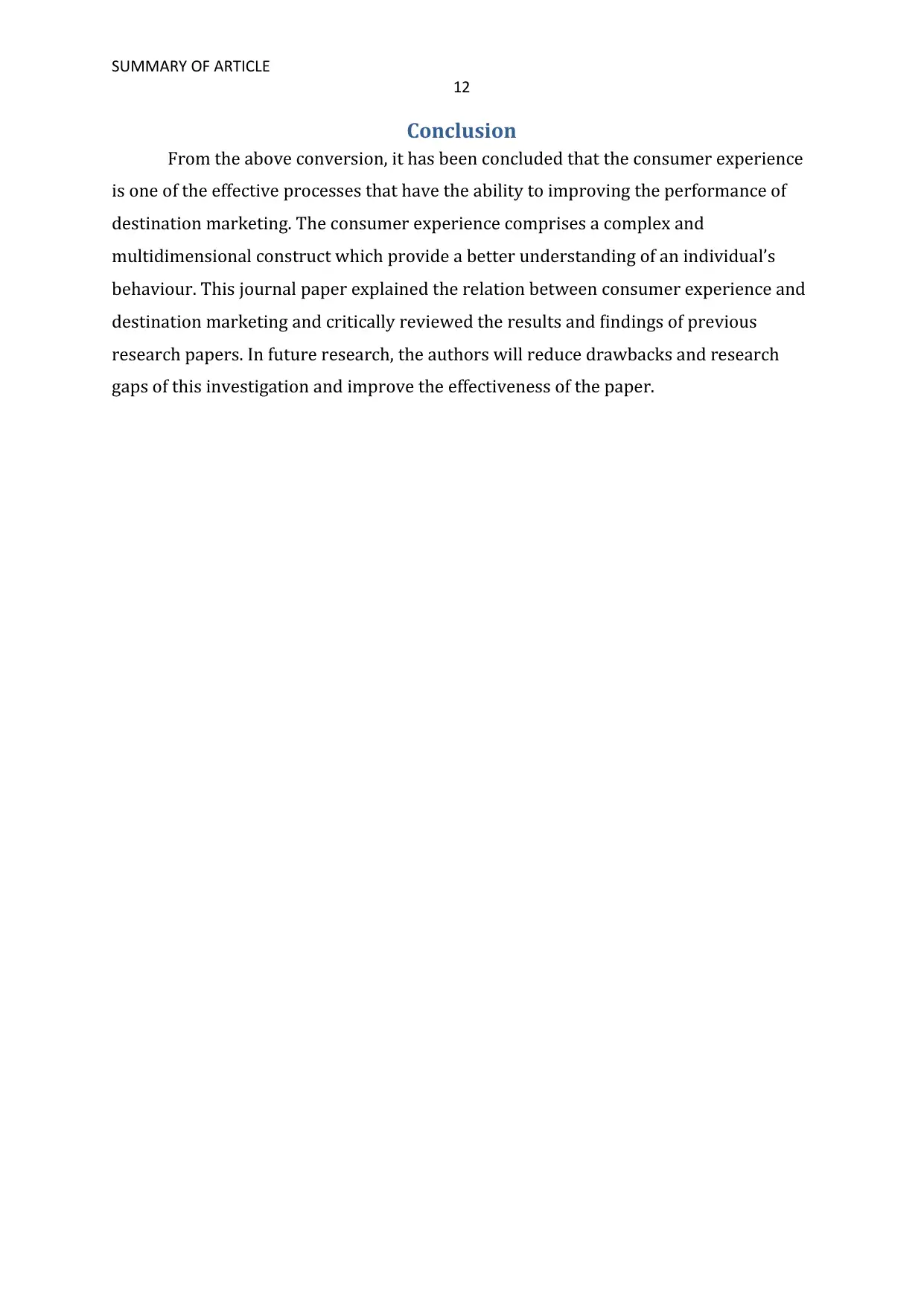
SUMMARY OF ARTICLE
12
Conclusion
From the above conversion, it has been concluded that the consumer experience
is one of the effective processes that have the ability to improving the performance of
destination marketing. The consumer experience comprises a complex and
multidimensional construct which provide a better understanding of an individual’s
behaviour. This journal paper explained the relation between consumer experience and
destination marketing and critically reviewed the results and findings of previous
research papers. In future research, the authors will reduce drawbacks and research
gaps of this investigation and improve the effectiveness of the paper.
12
Conclusion
From the above conversion, it has been concluded that the consumer experience
is one of the effective processes that have the ability to improving the performance of
destination marketing. The consumer experience comprises a complex and
multidimensional construct which provide a better understanding of an individual’s
behaviour. This journal paper explained the relation between consumer experience and
destination marketing and critically reviewed the results and findings of previous
research papers. In future research, the authors will reduce drawbacks and research
gaps of this investigation and improve the effectiveness of the paper.
Paraphrase This Document
Need a fresh take? Get an instant paraphrase of this document with our AI Paraphraser
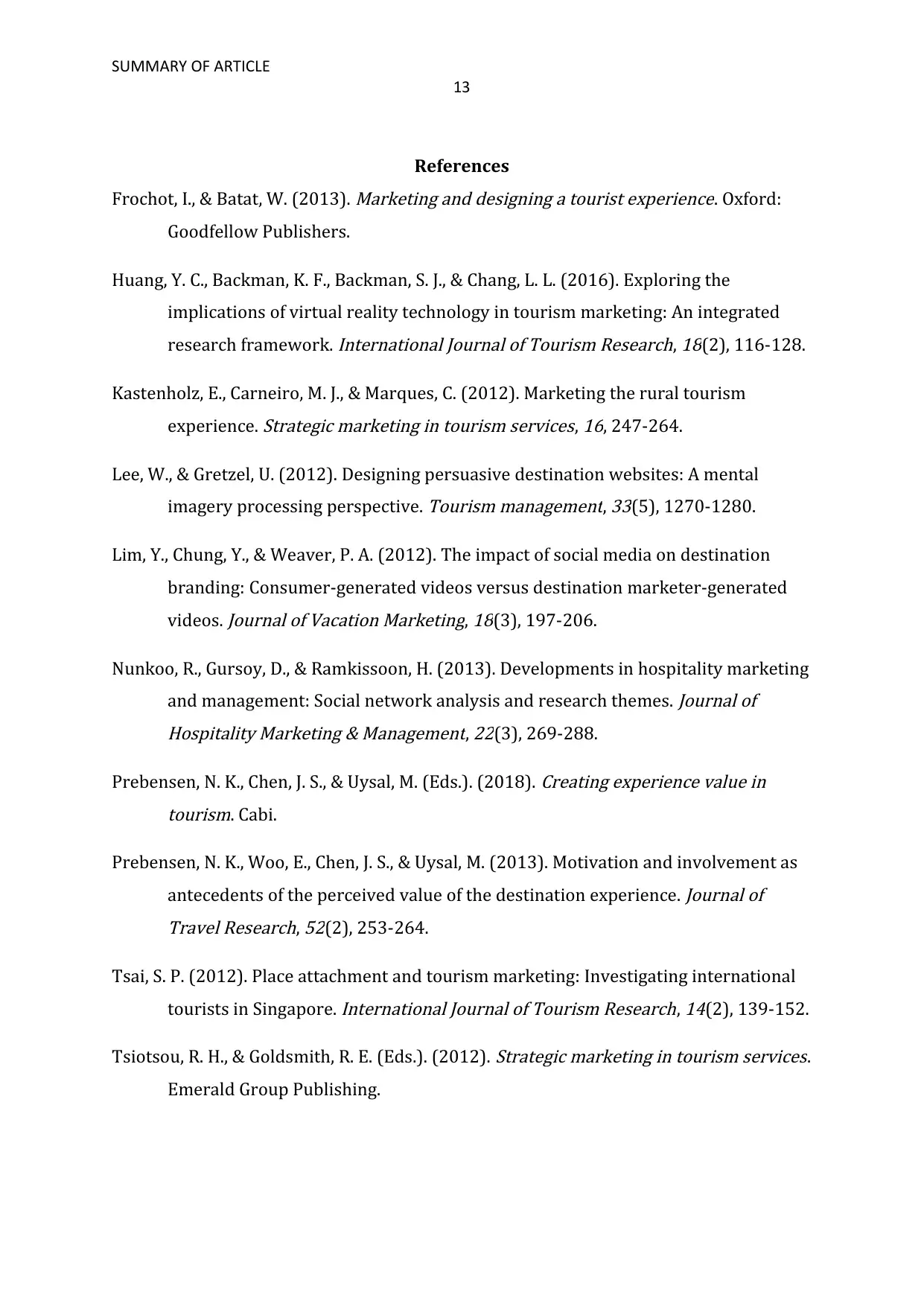
SUMMARY OF ARTICLE
13
References
Frochot, I., & Batat, W. (2013).
Marketing and designing a tourist experience. Oxford:
Goodfellow Publishers.
Huang, Y. C., Backman, K. F., Backman, S. J., & Chang, L. L. (2016). Exploring the
implications of virtual reality technology in tourism marketing: An integrated
research framework.
International Journal of Tourism Research,
18(2), 116-128.
Kastenholz, E., Carneiro, M. J., & Marques, C. (2012). Marketing the rural tourism
experience.
Strategic marketing in tourism services,
16, 247-264.
Lee, W., & Gretzel, U. (2012). Designing persuasive destination websites: A mental
imagery processing perspective.
Tourism management,
33(5), 1270-1280.
Lim, Y., Chung, Y., & Weaver, P. A. (2012). The impact of social media on destination
branding: Consumer-generated videos versus destination marketer-generated
videos.
Journal of Vacation Marketing,
18(3), 197-206.
Nunkoo, R., Gursoy, D., & Ramkissoon, H. (2013). Developments in hospitality marketing
and management: Social network analysis and research themes.
Journal of
Hospitality Marketing & Management,
22(3), 269-288.
Prebensen, N. K., Chen, J. S., & Uysal, M. (Eds.). (2018).
Creating experience value in
tourism. Cabi.
Prebensen, N. K., Woo, E., Chen, J. S., & Uysal, M. (2013). Motivation and involvement as
antecedents of the perceived value of the destination experience.
Journal of
Travel Research,
52(2), 253-264.
Tsai, S. P. (2012). Place attachment and tourism marketing: Investigating international
tourists in Singapore.
International Journal of Tourism Research,
14(2), 139-152.
Tsiotsou, R. H., & Goldsmith, R. E. (Eds.). (2012).
Strategic marketing in tourism services.
Emerald Group Publishing.
13
References
Frochot, I., & Batat, W. (2013).
Marketing and designing a tourist experience. Oxford:
Goodfellow Publishers.
Huang, Y. C., Backman, K. F., Backman, S. J., & Chang, L. L. (2016). Exploring the
implications of virtual reality technology in tourism marketing: An integrated
research framework.
International Journal of Tourism Research,
18(2), 116-128.
Kastenholz, E., Carneiro, M. J., & Marques, C. (2012). Marketing the rural tourism
experience.
Strategic marketing in tourism services,
16, 247-264.
Lee, W., & Gretzel, U. (2012). Designing persuasive destination websites: A mental
imagery processing perspective.
Tourism management,
33(5), 1270-1280.
Lim, Y., Chung, Y., & Weaver, P. A. (2012). The impact of social media on destination
branding: Consumer-generated videos versus destination marketer-generated
videos.
Journal of Vacation Marketing,
18(3), 197-206.
Nunkoo, R., Gursoy, D., & Ramkissoon, H. (2013). Developments in hospitality marketing
and management: Social network analysis and research themes.
Journal of
Hospitality Marketing & Management,
22(3), 269-288.
Prebensen, N. K., Chen, J. S., & Uysal, M. (Eds.). (2018).
Creating experience value in
tourism. Cabi.
Prebensen, N. K., Woo, E., Chen, J. S., & Uysal, M. (2013). Motivation and involvement as
antecedents of the perceived value of the destination experience.
Journal of
Travel Research,
52(2), 253-264.
Tsai, S. P. (2012). Place attachment and tourism marketing: Investigating international
tourists in Singapore.
International Journal of Tourism Research,
14(2), 139-152.
Tsiotsou, R. H., & Goldsmith, R. E. (Eds.). (2012).
Strategic marketing in tourism services.
Emerald Group Publishing.
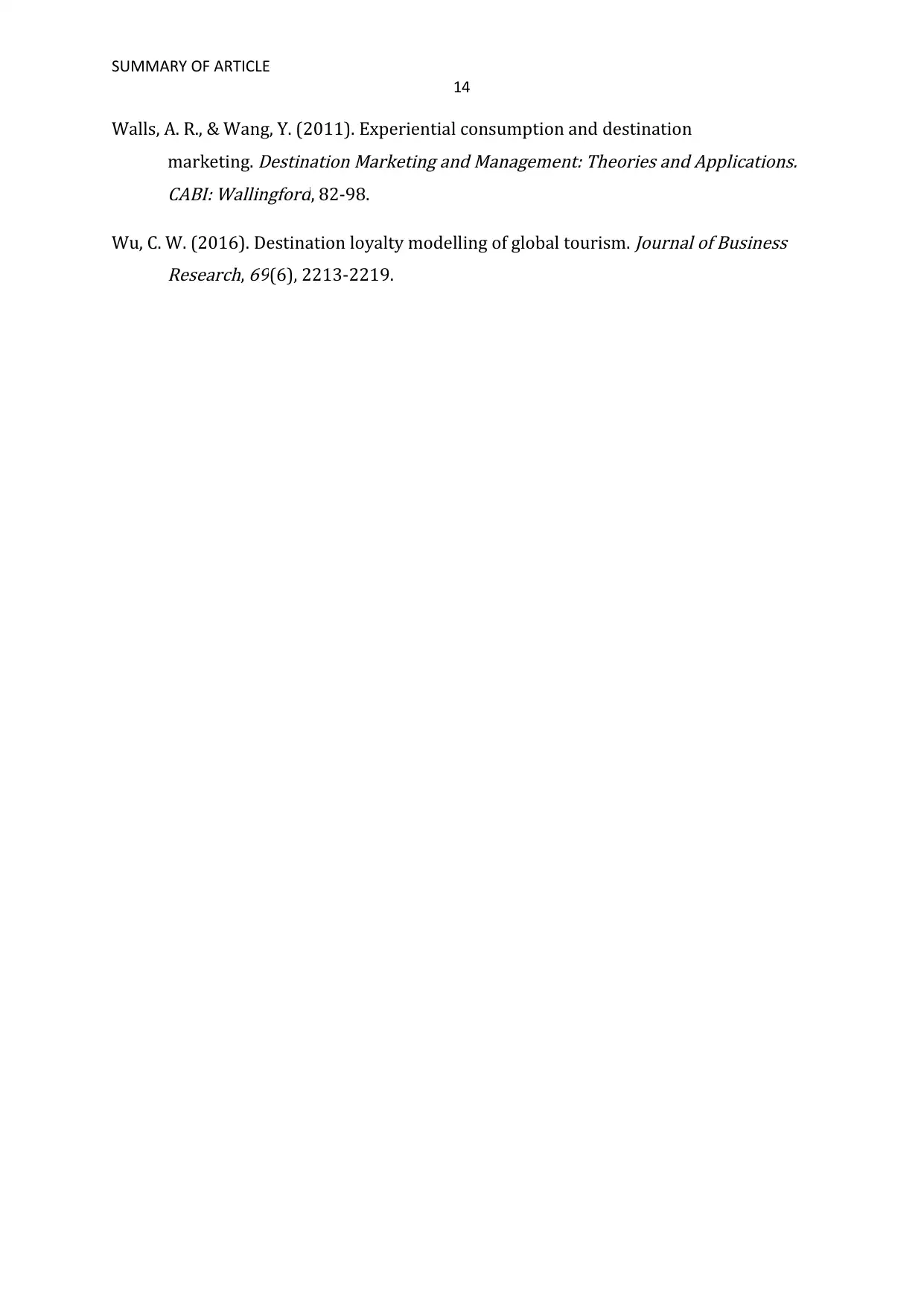
SUMMARY OF ARTICLE
14
Walls, A. R., & Wang, Y. (2011). Experiential consumption and destination
marketing.
Destination Marketing and Management: Theories and Applications.
CABI: Wallingford, 82-98.
Wu, C. W. (2016). Destination loyalty modelling of global tourism.
Journal of Business
Research,
69(6), 2213-2219.
14
Walls, A. R., & Wang, Y. (2011). Experiential consumption and destination
marketing.
Destination Marketing and Management: Theories and Applications.
CABI: Wallingford, 82-98.
Wu, C. W. (2016). Destination loyalty modelling of global tourism.
Journal of Business
Research,
69(6), 2213-2219.
1 out of 15
Related Documents
Your All-in-One AI-Powered Toolkit for Academic Success.
+13062052269
info@desklib.com
Available 24*7 on WhatsApp / Email
![[object Object]](/_next/static/media/star-bottom.7253800d.svg)
Unlock your academic potential
© 2024 | Zucol Services PVT LTD | All rights reserved.





